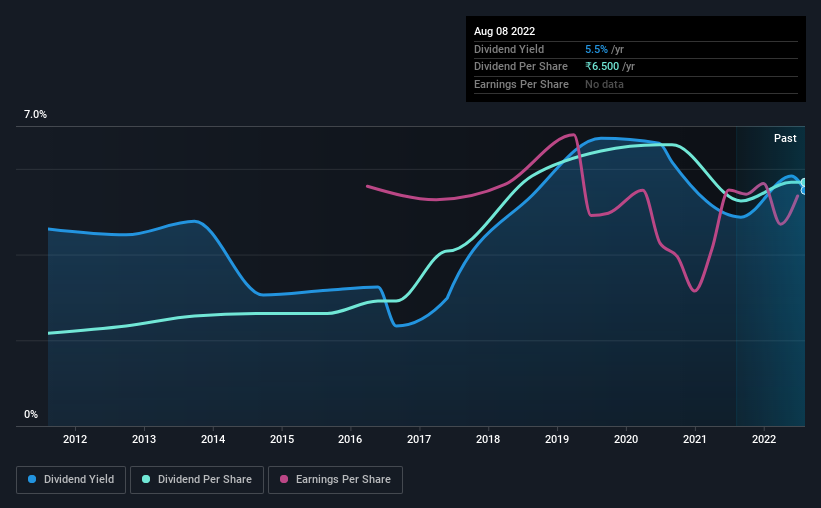
Balmer Lawrie & Co. Ltd. (NSE:BALMLAWRIE) will increase its dividend from last year's comparable payment on the 27th of October to ₹6.50. This will take the dividend yield to an attractive 5.5%, providing a nice boost to shareholder returns.
Check out our latest analysis for Balmer Lawrie
Balmer Lawrie's Dividend Is Well Covered By Earnings
If the payments aren't sustainable, a high yield for a few years won't matter that much. Prior to this announcement, Balmer Lawrie's dividend was making up a very large proportion of earnings, and the company was also not generating any cash flow to offset this. This is a pretty unsustainable practice, and could be risky if continued for the long term.
Earnings per share could rise by 0.3% over the next year if things go the same way as they have for the last few years. If recent patterns in the dividend continue, the payout ratio in 12 months could be 76% which is a bit high but can definitely be sustainable.

Dividend Volatility
Although the company has a long dividend history, it has been cut at least once in the last 10 years. Since 2012, the dividend has gone from ₹2.48 total annually to ₹6.50. This implies that the company grew its distributions at a yearly rate of about 10% over that duration. Dividends have grown rapidly over this time, but with cuts in the past we are not certain that this stock will be a reliable source of income in the future.
Balmer Lawrie May Find It Hard To Grow The Dividend
Growing earnings per share could be a mitigating factor when considering the past fluctuations in the dividend. Although it's important to note that Balmer Lawrie's earnings per share has basically not grown from where it was five years ago, which could erode the purchasing power of the dividend over time. There are exceptions, but limited earnings growth and a high payout ratio can signal that a company has reached maturity. When the rate of return on reinvestment opportunities falls below a certain minimum level, companies often elect to pay a larger dividend instead. This is why many mature companies often have larger dividend yields.
In Summary
Overall, we always like to see the dividend being raised, but we don't think Balmer Lawrie will make a great income stock. While the low payout ratio is redeeming feature, this is offset by the minimal cash to cover the payments. We would probably look elsewhere for an income investment.
Investors generally tend to favour companies with a consistent, stable dividend policy as opposed to those operating an irregular one. Meanwhile, despite the importance of dividend payments, they are not the only factors our readers should know when assessing a company. Case in point: We've spotted 2 warning signs for Balmer Lawrie (of which 1 is a bit concerning!) you should know about. If you are a dividend investor, you might also want to look at our curated list of high yield dividend stocks.
Valuation is complex, but we're here to simplify it.
Discover if Balmer Lawrie might be undervalued or overvalued with our detailed analysis, featuring fair value estimates, potential risks, dividends, insider trades, and its financial condition.
Access Free AnalysisHave feedback on this article? Concerned about the content? Get in touch with us directly. Alternatively, email editorial-team (at) simplywallst.com.
This article by Simply Wall St is general in nature. We provide commentary based on historical data and analyst forecasts only using an unbiased methodology and our articles are not intended to be financial advice. It does not constitute a recommendation to buy or sell any stock, and does not take account of your objectives, or your financial situation. We aim to bring you long-term focused analysis driven by fundamental data. Note that our analysis may not factor in the latest price-sensitive company announcements or qualitative material. Simply Wall St has no position in any stocks mentioned.
About NSEI:BALMLAWRIE
Balmer Lawrie
Engages in industrial packaging, greases and lubricants, chemicals, logistic services and infrastructure, refinery and oil field, and travel and vacation services businesses in India and internationally.
Flawless balance sheet average dividend payer.
Similar Companies
Market Insights
Community Narratives




